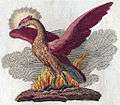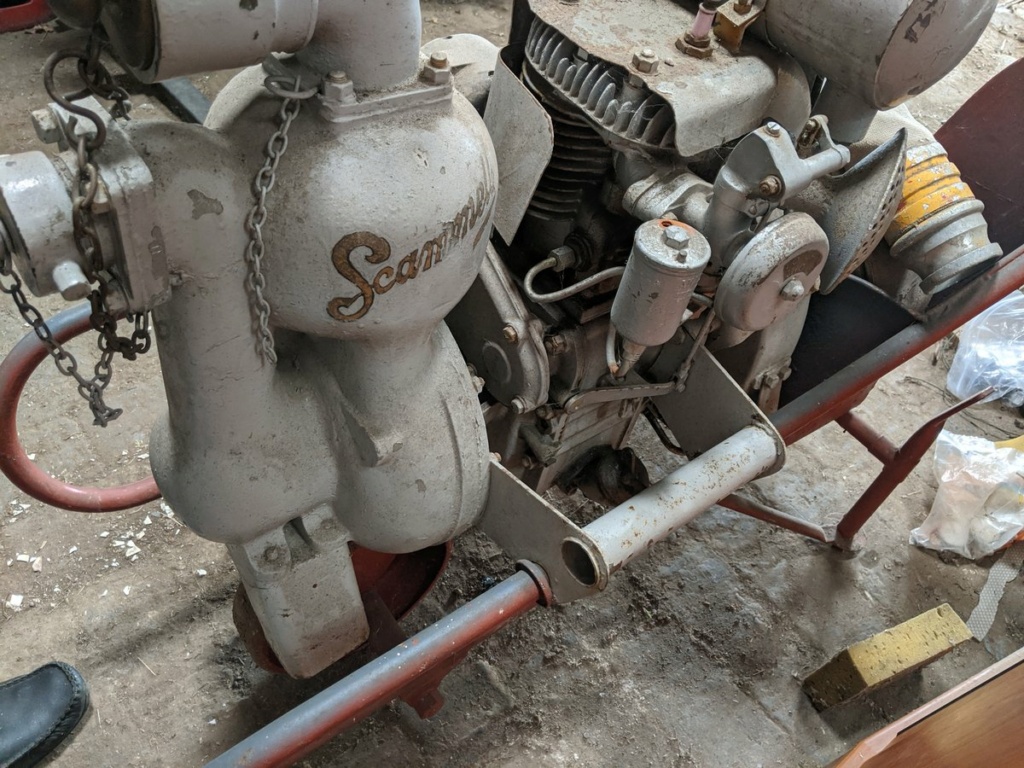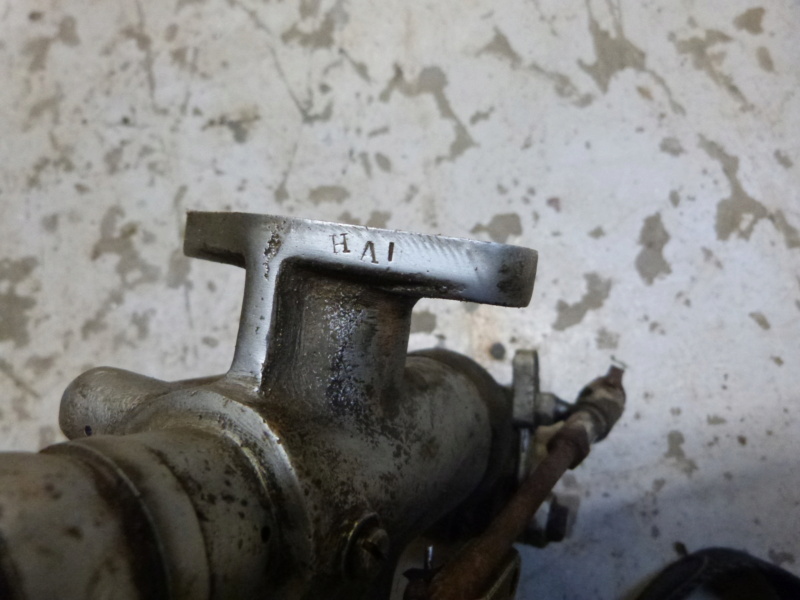Amal carburetter identification
+3
blue cat
mattblack
Woodsman
7 posters
Page 1 of 2
Page 1 of 2 • 1, 2 
 Amal carburetter identification
Amal carburetter identification
Hi all, this looked like the most appropriate place to post this. I have an old Amal carb which was amongst a box of old bits I came by, mags, carbs, starters etc. I have been trawling the net for info but I have failed to find anything similar, I have even tried Burlen but they couldn't help so I have joined here in the hope that some members here may have come across anything similar. The carb is a pre-monobloc type with the id number stamped on the mounting flange T15TT39LS on the underside of the flange it has HAI stamped. The TT type carbs are usually used in racing applications but this carb is unusual in the fact that it is lever operated as opposed to cable and has a choke blade/butterfly. Being lever operated makes me think that this carb has been on a stationary type engine rather than a motorbike. I do not have my phone with me at the moment so I can't post a picture just now. Any help greatly appreciated, thank you.
xulih- Born to be wild

- Posts : 20
Join date : 2020-07-29
Location : Orkney
 Re: Amal carburetter identification
Re: Amal carburetter identification
Hi xulih (?).
I took the liberty of moving your post to a more appropriate forum.
I took the liberty of moving your post to a more appropriate forum.
_________________
Regards Paul
Tha can alus tell a Yorkshireman - but tha can't tell him much.

Woodsman- Admin
- Posts : 2818
Join date : 2014-08-24
Age : 73
Location : God's own county
 Re: Amal carburetter identification
Re: Amal carburetter identification
Thank you Woodsman 
xulih- Born to be wild

- Posts : 20
Join date : 2020-07-29
Location : Orkney
 Re: Amal carburetter identification
Re: Amal carburetter identification
Nothing like it here? http://amalcarb.co.uk/
_________________
Specialist in precision guesswork.

mattblack- Life Member

- Posts : 889
Join date : 2019-06-21
Location : Leicester, me duck...
 Re: Amal carburetter identification
Re: Amal carburetter identification
I did drop them an email but they couldn't identify it. Although they did say that the T15TT9 was a racing carburetter so the lever operation was quite unusual.
xulih- Born to be wild

- Posts : 20
Join date : 2020-07-29
Location : Orkney
 Re: Amal carburetter identification
Re: Amal carburetter identification
I'm thinking maybe Scott/Jowett air cooled engine like on a generating set, or maybe a Scammell engine like on a fire pump ???
_________________
blue cat
blue cat- Life Member

- Posts : 1065
Join date : 2013-10-10
 Re: Amal carburetter identification
Re: Amal carburetter identification
I've just checked my Jowett / Scott generators information sheets and mine are fitted with the Amal 15TT39LS. So it seems to be a very similar number to the one you have on your carburettor, although yours is prefixed with an additional T, don't know if that indicates any difference or is of any importance. So might be from a Scott /Jowett engine?
Neil
Neil
neil (LE)- A credit to the forum

- Posts : 399
Join date : 2012-03-21
Age : 68
Location : N/W Kent
 Re: Amal carburetter identification
Re: Amal carburetter identification
Thank you blue cat and neil (LE) for your quick response and pointers. I will do some poking around in that direction  I was thinking along the lines of agricultural or marine applications or possible ex MOD as the bits came from a croft in Orkney.
I was thinking along the lines of agricultural or marine applications or possible ex MOD as the bits came from a croft in Orkney.
xulih- Born to be wild

- Posts : 20
Join date : 2020-07-29
Location : Orkney
 Re: Amal carburetter identification
Re: Amal carburetter identification
I have found a post on here in the New Projects/Restorations section, Scott PAB Restoration ( sorry but not allowed to post links yet ) posted by Abes and that is the same carb , only difference is the top part where the throttle linkage is brass on the carb that I have 
xulih- Born to be wild

- Posts : 20
Join date : 2020-07-29
Location : Orkney
 Re: Amal carburetter identification
Re: Amal carburetter identification
Hi, on closer examination of the documentation I have, I think you can almost positively say that your carburetter is from an ex Scott / Jowett two stroke air cooled engine. Also as those engines were only ever used on the generating sets, never originally built for any other purpose, I suggest, if you agree on it being a Scott engine carburetter, you can say it was originally from the Bofors gun generating set.
The reason I suggest this is the case, is because the documentation I have states, I quote, "The Carburetter has been specially designed for use with the SCOTT Engine, and is based on the Amal T.T.38 type." (the use of upper case is as printed).
I am therefore taking a leap of faith that the carburetter derived from the type 38, became the type 39, solely for use with the Scott / Jowett engine and therefore the generator sets themselves. So unless there was a later approved use for the type 39, which I am not aware of, then they were only produced in low numbers to be fitted to a very limited quantity of generator sets. Maybe the prefix of the T indicates a different use?
Others may know different but if that is the case then please share, as it is these details which make the subject of stationary engine collecting, all the more interesting.
Cheers,
Neil

Overall view of the type 39 Amal carburetter as fitted to Scott / Jowett engines. (Minus float bowl assembly)

Type number as stamped on the intake flange.
The reason I suggest this is the case, is because the documentation I have states, I quote, "The Carburetter has been specially designed for use with the SCOTT Engine, and is based on the Amal T.T.38 type." (the use of upper case is as printed).
I am therefore taking a leap of faith that the carburetter derived from the type 38, became the type 39, solely for use with the Scott / Jowett engine and therefore the generator sets themselves. So unless there was a later approved use for the type 39, which I am not aware of, then they were only produced in low numbers to be fitted to a very limited quantity of generator sets. Maybe the prefix of the T indicates a different use?
Others may know different but if that is the case then please share, as it is these details which make the subject of stationary engine collecting, all the more interesting.
Cheers,
Neil

Overall view of the type 39 Amal carburetter as fitted to Scott / Jowett engines. (Minus float bowl assembly)

Type number as stamped on the intake flange.
Last edited by neil (LE) on Thu Jul 30 2020, 13:57; edited 1 time in total (Reason for editing : corrected wording.)
neil (LE)- A credit to the forum

- Posts : 399
Join date : 2012-03-21
Age : 68
Location : N/W Kent
 Re: Amal carburetter identification
Re: Amal carburetter identification
That's excellent, thank you so much Neil. On your top picture on the bit that is circled on the lower main body my carb has 3/4 stamped and on the underside of the intake flange HAI. I will post some pictures when I am allowed.
xulih- Born to be wild

- Posts : 20
Join date : 2020-07-29
Location : Orkney
 Re: Amal carburetter identification
Re: Amal carburetter identification
As an additional point of potential interest to those who either own or have used a Scott / Jowett engine with this Amal carb, is the air induction silencer that was originally fitted to these units. Great store was placed on the silent (?) running of these units and one of the features that was utilised to reduce the noise levels, was the large induction silencer and filter unit. It must be one of the largest units, compared with engine size, ever fitted. Unless you know different!
The one shown in the picture is minus the actual air dust filter units which would have been round can shaped, viscous mesh type, which were wetted with engine oil and would have been held in place by screwed in end caps, sadly missing. As the carburetter is a Amal item, I'm hopeful the filter utilised a common part from the Amal range and I will be able to identify and acquire suitable replacement filter units and end caps, probably from the motorbike engine range.

Amal type 39 actually fitted to the Jowett generator set.

The same identification marks are stamped onto this carburetter, note this one is nickle(?) plated, not plain brass.

Overall view of the induction silencer at 14" long (minus air filters) x 4" diameter. Note the captive nut on the bracket, for the filter end cap to be secured to. One at each end.

Inner construction of the induction silencer.
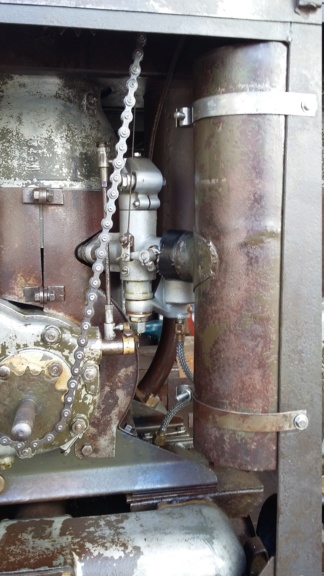
End view of set showing how the silencer / filter unit is mounted onto the frame, utilising a short flexible adaptor to connect between filter and carburetter.
The one shown in the picture is minus the actual air dust filter units which would have been round can shaped, viscous mesh type, which were wetted with engine oil and would have been held in place by screwed in end caps, sadly missing. As the carburetter is a Amal item, I'm hopeful the filter utilised a common part from the Amal range and I will be able to identify and acquire suitable replacement filter units and end caps, probably from the motorbike engine range.

Amal type 39 actually fitted to the Jowett generator set.

The same identification marks are stamped onto this carburetter, note this one is nickle(?) plated, not plain brass.

Overall view of the induction silencer at 14" long (minus air filters) x 4" diameter. Note the captive nut on the bracket, for the filter end cap to be secured to. One at each end.

Inner construction of the induction silencer.

End view of set showing how the silencer / filter unit is mounted onto the frame, utilising a short flexible adaptor to connect between filter and carburetter.
neil (LE)- A credit to the forum

- Posts : 399
Join date : 2012-03-21
Age : 68
Location : N/W Kent
 Re: Amal carburetter identification
Re: Amal carburetter identification
_________________
blue cat
blue cat- Life Member

- Posts : 1065
Join date : 2013-10-10
 Re: Amal carburetter identification
Re: Amal carburetter identification
Hi Blue Cat that is interesting, I would like to know what the model number of that carb is. The body looks to be the same, just the extension tube on the throttle control is different. I don't know what era these Scammell pumps are but I assume they were developed during the war period, the same as the Scott. So it would be reasonable to assume as much reuse of components as possible would have been encouraged. In this case the body of the Amal TT type being utilised but maybe with different jetting or choke size. If so then this carb may have been allocated a different model number to reflect the change of jets or choke slide cutaway but if the only difference was the spacer tube on the throttle control perhaps that would account for the "T" prefix on the carb in question.
It would also be useful to know if the filter unit on the Scammell engine carb, is a standard item and if so are there any available. They would be useful to use on Scott / Jowett engines, where the induction silencer / filter is missing, which it is, in most cases that I have seen.
Neil.
It would also be useful to know if the filter unit on the Scammell engine carb, is a standard item and if so are there any available. They would be useful to use on Scott / Jowett engines, where the induction silencer / filter is missing, which it is, in most cases that I have seen.
Neil.
neil (LE)- A credit to the forum

- Posts : 399
Join date : 2012-03-21
Age : 68
Location : N/W Kent
xulih- Born to be wild

- Posts : 20
Join date : 2020-07-29
Location : Orkney
 Re: Amal carburetter identification
Re: Amal carburetter identification
Hi, what a difference a picture can make. I'm now not so certain that your carburetter is definitely from a Scott / Jowett set. Perhaps the "T" prefix does indicate a different build and use. The issue that concerns me is the length of the throttle control rod, looking at your photograph (the forth one down especially) the overall length seems to be quiet a bit shorter than the ones fitted to the Scott sets. I have measured mine and the full length, from the top of the upper adjuster to the bottom of the lower one, is about 8" and the plain section of rod between the threaded ends is 4.25" Also as can be seen from the pictures, the rod needs to be as long as the carburetter body so it to be able to connect between the throttle operating lever on the carburetter and the output shaft from the governor control on the engine. It may be it is just the angle of your pictures which has confused me but it would be interesting to know if there is a difference in the length of the operating rod, as that could prove to be conclusive.
I have checked on one of the carburetters I have and where you have HA 1 stamped, I have DG 4. Not certain what these markings indicate but I wondered if they were manufactures markings or a quality checking stamping.
Neil

Picture showing how the length of the rod is about the same as the overall height of the carburetter body.
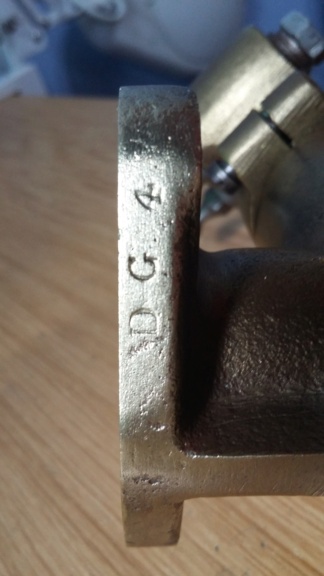
I'll raise your HA 1 with a DG 4, not certain what these marks indicate.
I have checked on one of the carburetters I have and where you have HA 1 stamped, I have DG 4. Not certain what these markings indicate but I wondered if they were manufactures markings or a quality checking stamping.
Neil

Picture showing how the length of the rod is about the same as the overall height of the carburetter body.

I'll raise your HA 1 with a DG 4, not certain what these marks indicate.
neil (LE)- A credit to the forum

- Posts : 399
Join date : 2012-03-21
Age : 68
Location : N/W Kent
 Re: Amal carburetter identification
Re: Amal carburetter identification
Hi Neil, well spotted.The connecting rod is indeed shorter on my carb @ 6.52" total and 3.25" between the threaded ends so looks like DG 4 takes HA 1 in the length of rod at least. The mystery continues then !
xulih- Born to be wild

- Posts : 20
Join date : 2020-07-29
Location : Orkney
 Re: Amal carburetter identification
Re: Amal carburetter identification
neil (LE) how does the the Scott sound through the induction silencer? Mine engine wasn't partially noisy but the intake noise was quite annoying.
StuartTurnerSteve- Life Member

- Posts : 534
Join date : 2020-01-02
 Re: Amal carburetter identification
Re: Amal carburetter identification
Steve, the induction silencer does modify the engine sound quiet nicely but to suggest the unit is in anyway quietened by this addition, does seem to stretch the point a bit. Once the complete unit is running at full chat, at 3000 rpm, with the fan, alternator, exciter and their drive belts whirring away, all inside a vibrating metal box, you couldn't class the unit as silent! In fact when the unit is initially cranked over and fires up, it can be quite intimidating as the engine spins up to speed, until the governor takes control. I imagine when first produced, 80 years ago, they may have been a bit quieter, as I expect by now some of the anti-vibration mounts are no longer performing their duty as they were designed to do.
Even though it is relatively noisy, especially when operating on the drive at home, I do still enjoy running the unit and have used getting pictures to post with these carburetter discussions, as an excuse to have a couple of cheeky running sessions over the last few days. I was hoping to be able to show the set at the Chatham Dockyards 40's weekend but I think it's unlikely that will be going ahead.
Neil.

Generator set as run up in trailer, note the twin exhaust marks on the back wall!
Even though it is relatively noisy, especially when operating on the drive at home, I do still enjoy running the unit and have used getting pictures to post with these carburetter discussions, as an excuse to have a couple of cheeky running sessions over the last few days. I was hoping to be able to show the set at the Chatham Dockyards 40's weekend but I think it's unlikely that will be going ahead.
Neil.

Generator set as run up in trailer, note the twin exhaust marks on the back wall!
neil (LE)- A credit to the forum

- Posts : 399
Join date : 2012-03-21
Age : 68
Location : N/W Kent
 Re: Amal carburetter identification
Re: Amal carburetter identification
Nice piece of kit Neil - love it!
_________________
Regards Paul
Tha can alus tell a Yorkshireman - but tha can't tell him much.

Woodsman- Admin
- Posts : 2818
Join date : 2014-08-24
Age : 73
Location : God's own county
 Re: Amal carburetter identification
Re: Amal carburetter identification
Nice to see a complete unit.

nickh- Expert

- Posts : 56
Join date : 2019-04-14
 Re: Amal carburetter identification
Re: Amal carburetter identification
Thanks for the run down Neil. Engine on their own can be made to tick over quite nicely, I think mine was down to 800rpm by the time I sold it to be reunited with a generator and bofors set out The Lizard.
StuartTurnerSteve- Life Member

- Posts : 534
Join date : 2020-01-02
 Re: Amal carburetter identification
Re: Amal carburetter identification
Hi gents, thanks for your comments. I do feel privileged to own this set, it is one of my favourites, not just because it is unusual but mainly because it is complete, fully operational and in near original condition. Mind you it did take a lot of effort to gently take the rust and corrosion off, without removing all the paint whilst doing so. In some ways it would have been easier to rub it back to bare metal and repaint it but I'm pleased I didn't.
Steve I did wonder what the minimum running speed would be for the Scott engine, as I was concerned I wouldn't be very welcome on the rally field operating the set at 3000 rpm all day. So I had considered removing the drive belt to the exciter, disconnecting the generator plug and running at slow speed for the majority of a rally day. I know what it is like to feel unwelcome, as one of my other engines is a 5 HP oily Petter!
Back to the carburetter question, I have taken another look over the Scott Amal caburetter and I have found the DG 4 stamping found on the intake flange, is repeated on the bottom of the jet block which I removed from the main body. So does this mean these parts are machined as a matched pair during the manufacturing process, or is there another reason for these markings, such as quality control as mentioned previously. In addition to these markings, I took the opportunity to look for other identification marks, in an attempt to prove if the carb in question is from, or could have been adapted to be used, on a Scott / Jowett engine. The first item checked was the slide and this is marked as a number 4, which checks out from some documentation. Then there are the two jets, the needle jet is marked with a 107 on one face and 10 on another, while the main jet has 100 stamped on it, if I've identified them the correct way around.
So the question to xulih is what markings has your carburetter got on these items? If the slide or the jets differ in a significant way, then I would suggest the carburetter is unlikely to have originally come from a Scott / Jowett engine, especially when the control rod length discrepancy is also taken into consideration. However that does not mean the carburetter could not be adapted to fit and operate on one of theses engines, as the main housing is standard and jets and slides can be changed.
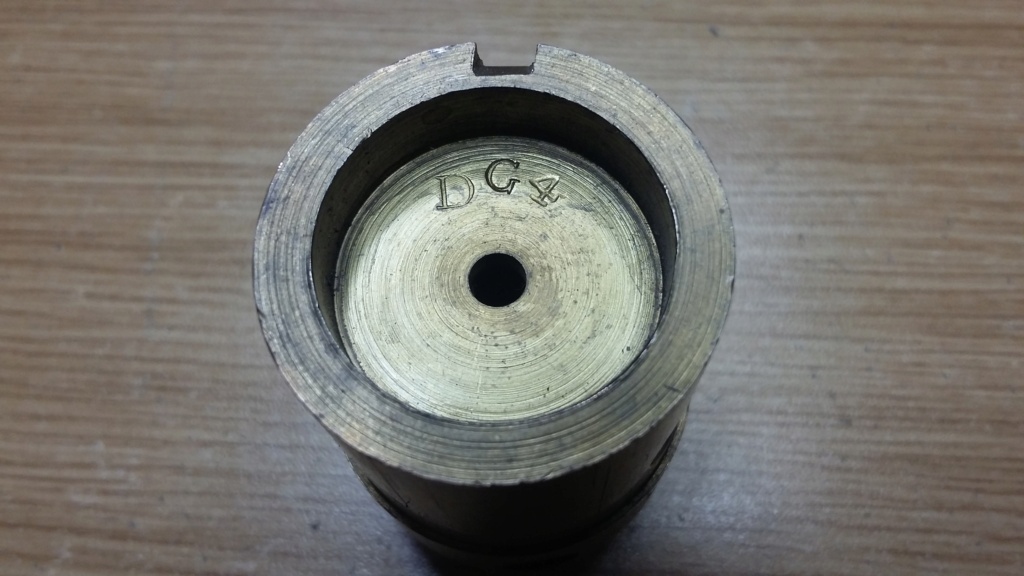
The corresponding marks on the main block.

Number 4 Slide
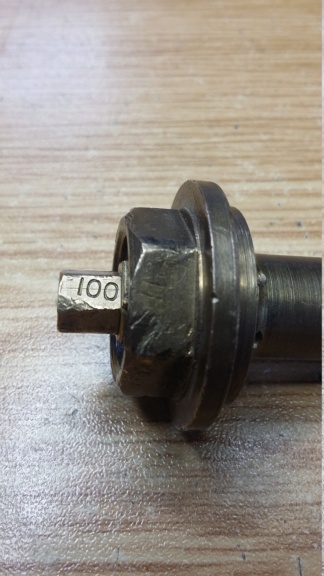
100 main jet.

Needle jet marked 107 on one face -

and 10 on the opposite face
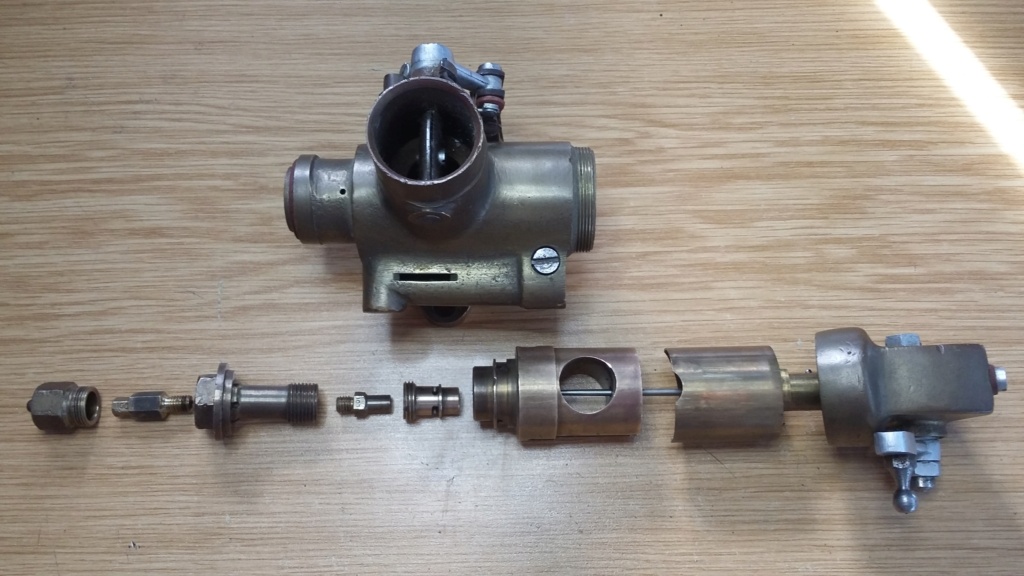
Component parts laid out.
Steve I did wonder what the minimum running speed would be for the Scott engine, as I was concerned I wouldn't be very welcome on the rally field operating the set at 3000 rpm all day. So I had considered removing the drive belt to the exciter, disconnecting the generator plug and running at slow speed for the majority of a rally day. I know what it is like to feel unwelcome, as one of my other engines is a 5 HP oily Petter!
Back to the carburetter question, I have taken another look over the Scott Amal caburetter and I have found the DG 4 stamping found on the intake flange, is repeated on the bottom of the jet block which I removed from the main body. So does this mean these parts are machined as a matched pair during the manufacturing process, or is there another reason for these markings, such as quality control as mentioned previously. In addition to these markings, I took the opportunity to look for other identification marks, in an attempt to prove if the carb in question is from, or could have been adapted to be used, on a Scott / Jowett engine. The first item checked was the slide and this is marked as a number 4, which checks out from some documentation. Then there are the two jets, the needle jet is marked with a 107 on one face and 10 on another, while the main jet has 100 stamped on it, if I've identified them the correct way around.
So the question to xulih is what markings has your carburetter got on these items? If the slide or the jets differ in a significant way, then I would suggest the carburetter is unlikely to have originally come from a Scott / Jowett engine, especially when the control rod length discrepancy is also taken into consideration. However that does not mean the carburetter could not be adapted to fit and operate on one of theses engines, as the main housing is standard and jets and slides can be changed.

The corresponding marks on the main block.

Number 4 Slide

100 main jet.

Needle jet marked 107 on one face -

and 10 on the opposite face

Component parts laid out.
neil (LE)- A credit to the forum

- Posts : 399
Join date : 2012-03-21
Age : 68
Location : N/W Kent
 Re: Amal carburetter identification
Re: Amal carburetter identification
Looking at the photos I recon that '10' is actually '107' as there appears to be a faint line after the '0'. It's looks to me as if it was stamped higher on one side then partly machined away.
_________________
Specialist in precision guesswork.

mattblack- Life Member

- Posts : 889
Join date : 2019-06-21
Location : Leicester, me duck...
 Re: Amal carburetter identification
Re: Amal carburetter identification
Good spot mattblack, your specialism in precision guesswork could prove invaluable! I will take a closer look under the magnifier lamp tomorrow, to see if I can confirm your suggestion. It would make a lot of sense and take away the confusion of two different numbers on the jet. Cheers, Neil.
neil (LE)- A credit to the forum

- Posts : 399
Join date : 2012-03-21
Age : 68
Location : N/W Kent
Page 1 of 2 • 1, 2 
 Similar topics
Similar topics» Villiers type V carburetter
» amal carb 379/78
» Amal carb ID help
» Villiers F15 with Amal carb - is this a good idea?
» Set up for an Amal carbie on Ruston PT
» amal carb 379/78
» Amal carb ID help
» Villiers F15 with Amal carb - is this a good idea?
» Set up for an Amal carbie on Ruston PT
Page 1 of 2
Permissions in this forum:
You cannot reply to topics in this forum